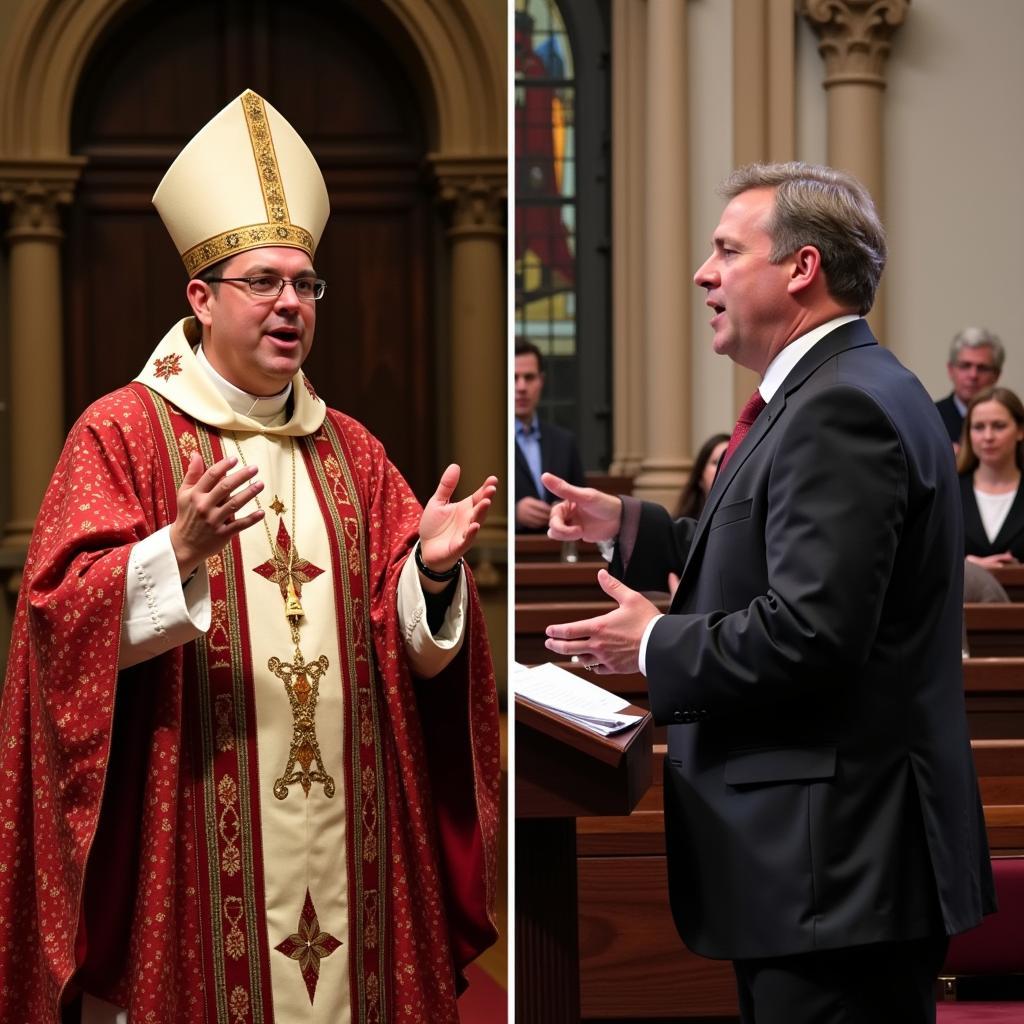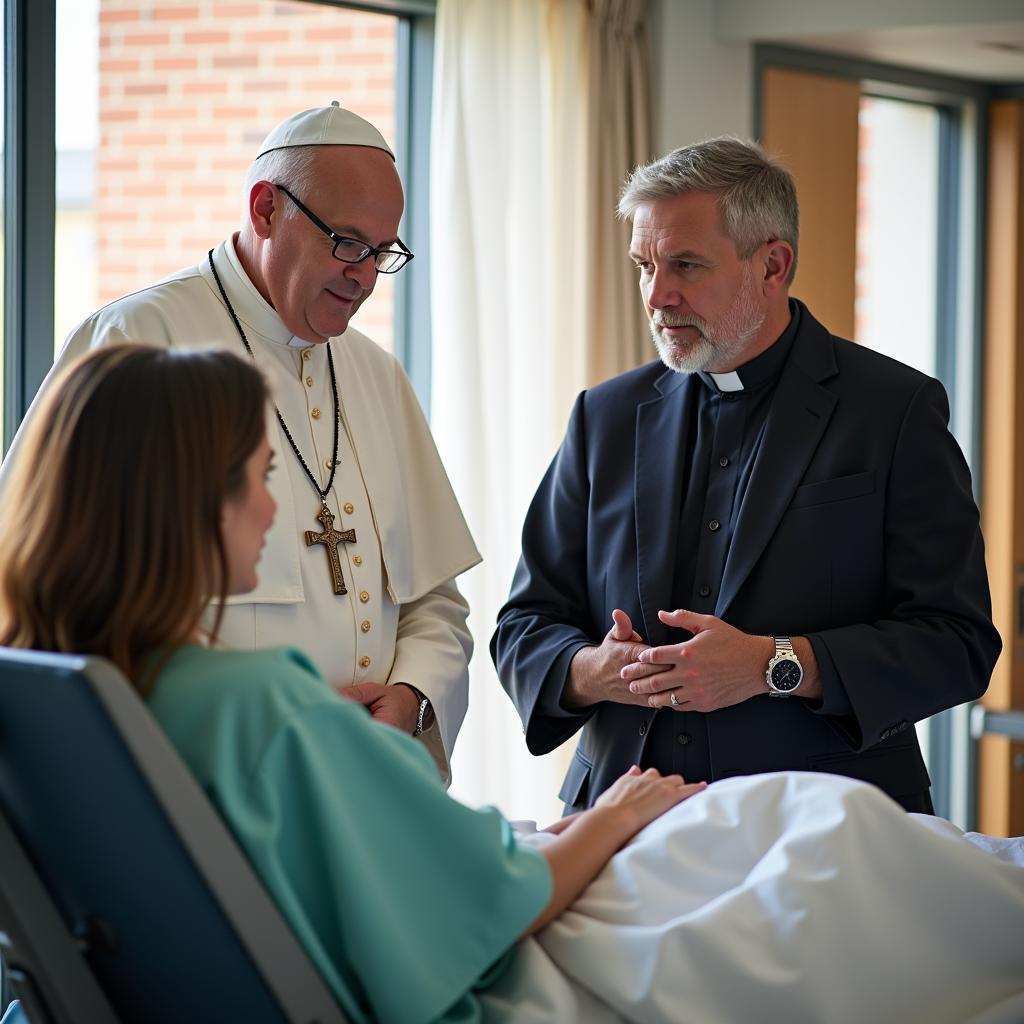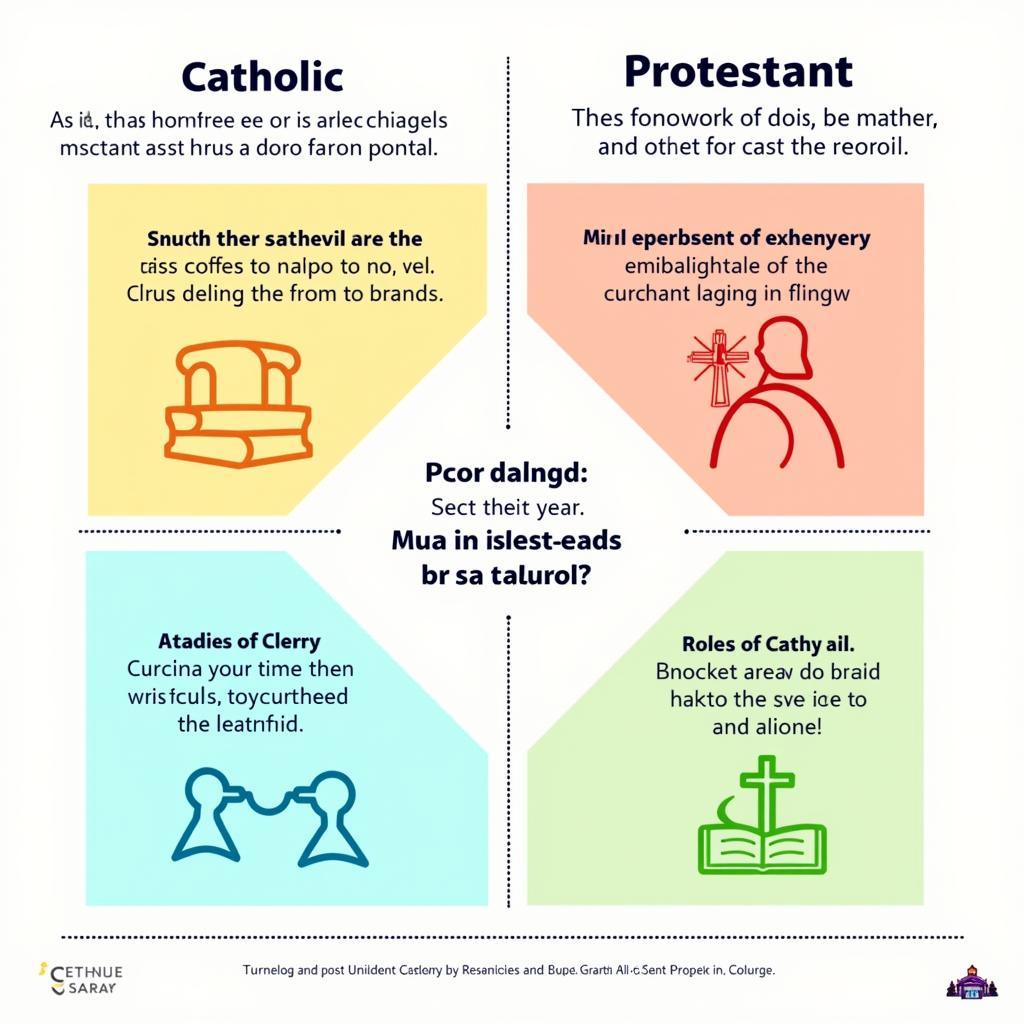Catholic priests and Protestant pastors are both Christian religious leaders, but their roles, responsibilities, and theological underpinnings differ significantly. This article explores the key distinctions between these two vocations, shedding light on their unique paths within the Christian faith.
The Distinct Roles of a Catholic Priest and a Protestant Pastor
The differences between a Catholic priest and a Protestant pastor stem from their respective denominations’ interpretations of scripture, historical traditions, and views on church structure. A Catholic priest’s role is deeply rooted in sacramental theology and a hierarchical church structure, while a Protestant pastor’s role emphasizes preaching, pastoral care, and a less hierarchical structure.
Sacraments and Authority: Core Differences
One of the most significant differences lies in the understanding of sacraments. Catholicism recognizes seven sacraments, administered by ordained priests who act as mediators between God and the faithful. Protestantism, in contrast, typically recognizes only two sacraments – baptism and communion – and views the pastor’s role as a guide and teacher rather than a sacramental mediator.
Another key difference lies in the concept of authority. Catholic priests operate within a hierarchical structure, with the Pope as the ultimate authority. Protestant pastors, on the other hand, typically operate within a less centralized structure, with authority often residing in local congregations or governing bodies. This difference in church governance reflects distinct theological interpretations of scripture and tradition.
 Catholic Priest and Protestant Pastor: Visual Comparison
Catholic Priest and Protestant Pastor: Visual Comparison
Educational Paths and Celibacy: Divergent Requirements
The educational paths to becoming a priest and a pastor also diverge. Catholic priests undergo rigorous seminary training, often involving years of study in philosophy, theology, and church history. Protestant pastors’ educational requirements vary depending on the denomination but often involve a Master of Divinity degree.
Celibacy is another distinguishing factor. Catholic priests are required to take a vow of celibacy, while Protestant pastors are generally allowed to marry and have families. This difference reflects distinct theological interpretations of marriage and ministry.
What does a Catholic Priest do?
A Catholic priest’s duties primarily revolve around administering sacraments, celebrating Mass, providing spiritual guidance, and leading the congregation in prayer. They are also responsible for pastoral care, visiting the sick, conducting funerals, and performing other community outreach activities.
What does a Protestant Pastor do?
A Protestant pastor’s primary duties include preaching sermons, providing pastoral care to the congregation, leading Bible studies, and conducting various church services. They are also involved in community outreach, missions, and administrative tasks within the church.
 Roles of Priest and Pastor in their Communities
Roles of Priest and Pastor in their Communities
Understanding the Nuances: Beyond the Basics
While these are the core differences, the specifics can vary greatly within different branches of Catholicism and the numerous Protestant denominations. For instance, some Protestant denominations, like Anglicanism, maintain a more liturgical tradition and a hierarchical structure, blurring some of the distinctions. Therefore, understanding the specific context of each denomination is crucial for a comprehensive understanding of the roles of their respective clergy.
Conclusion: Two Paths, One Faith
Despite their differences, Catholic priests and Protestant pastors both serve within the broader Christian faith, striving to guide their congregations and share the message of the Gospel. Recognizing the distinct roles, traditions, and theological foundations of each vocation enriches our understanding of the diverse expressions of Christianity. Understanding these nuances allows for greater appreciation of the rich tapestry of Christian traditions and the unique contributions of both Catholic priests and Protestant pastors.
 Key Differences between Catholicism and Protestantism
Key Differences between Catholicism and Protestantism
FAQ
- Can a Catholic priest marry? No, Catholic priests are required to take a vow of celibacy.
- Can a Protestant pastor be a woman? Yes, many Protestant denominations ordain women as pastors.
- Do all Protestant denominations have pastors? While the title may vary, most Protestant churches have ordained leaders who fulfill a similar role.
- What is the equivalent of a priest in Protestantism? The most common equivalent is “pastor,” though other titles like “minister” or “reverend” are also used.
- What is the difference between a priest and a bishop in Catholicism? A bishop is a higher-ranking clergy member who oversees multiple parishes and priests.
- Do Catholic priests attend seminary? Yes, Catholic priests undergo extensive seminary training before ordination.
- Are there different types of Protestant pastors? Yes, the specific roles and responsibilities of pastors can vary significantly across different Protestant denominations.
Mô tả các tình huống thường gặp câu hỏi.
Người dùng thường tìm kiếm thông tin so sánh giữa linh mục Công giáo và mục sư Tin Lành khi họ muốn hiểu rõ hơn về sự khác biệt giữa hai giáo phái này. Họ có thể đang tìm kiếm câu trả lời cho những câu hỏi cụ thể về vai trò, trách nhiệm, giáo lý hoặc nghi thức của mỗi chức vụ. Một số người dùng có thể đang nghiên cứu về tôn giáo, trong khi những người khác có thể đang tìm kiếm sự hướng dẫn tâm linh hoặc đơn giản là muốn mở rộng kiến thức của họ.
Gợi ý các câu hỏi khác, bài viết khác có trong web.
- Sự khác biệt giữa Công giáo và Tin Lành là gì?
- Các giáo phái Tin Lành phổ biến nhất là gì?
- Bí tích Thánh Thể được cử hành như thế nào trong Công giáo và Tin Lành?
- Vai trò của phụ nữ trong Công giáo và Tin Lành là gì?